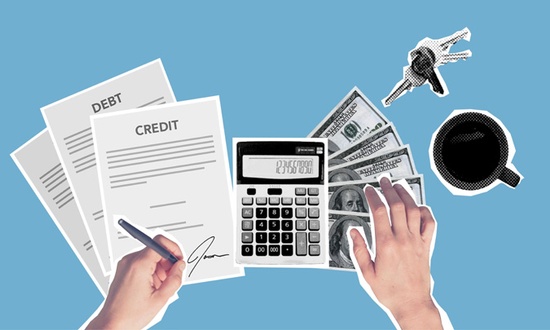Some financial counselors put home mortgages in a different category from other debts. One reason is that the loan is secured by the house’s equity. If financial crises arise and the payments can’t be made, the home can be sold and the equity—which is the current sale value of the house minus the amount still owed on the mortgage—can be regained. A case can certainly be made for borrowing to buy a reasonably priced house instead of renting. Although rental rates on houses may increase as much as 3 to 6 percent annually, the payments on a straight thirty-year mortgage remain constant throughout the life of the loan. Unless the economy slumps, or the house is located in an area with a depressed economy—and let me emphasize that both sometimes happen—the value of the house may also increase at 3 to 6 percent (or more) annually.
Unfortunately, many aspiring homeowners end up buying a house that’s out of their range. One long-standing, common formula for figuring out what’s affordable is that the purchase price of a home shouldn’t be more than two-and-a-half times the family’s gross annual income, though others say higher. But I encourage potential home buyers to only count the income of the primary breadwinner—God may lead a wife and mother to quit her job for the benefit of the children. Housing decisions based on two incomes often prove disastrous, creating temptations to neglect parental responsibilities.
For example, a Christian couple at our church assumed a large home mortgage that depended on both their incomes. When the wife became pregnant, they realized that to keep the house they’d have to violate their convictions against leaving their child in a day-care center while the mother worked.
Whenever we make lifestyle decisions that tempt us to violate our convictions, the consequences are severe. This couple should never have put themselves in that situation. But they could have recognized their error, asked God’s forgiveness, and taken whatever losses were necessary to get out of bondage and into housing affordable for a single income. Instead, they opted to provide a beautiful house for their children to grow up in while robbing them of something far more important—the presence of their mother. In seeking a higher standard of living, this couple ended up sacrificing a higher standard of life. They and their children (now grown) paid a terrible price.
The monthly payment for a home mortgage, including taxes and insurance, shouldn’t be much more than people are willing to pay for rent. Most of the monthly mortgage payment goes for interest, but there are tax deductions that will reduce the net cost. Money paid for rent isn’t tax deductible and doesn’t build equity; on the other hand, people always spend more on fixtures and decorations when they buy.
Not all debt is the same. I’m sympathetic to farmers, accident victims, the unemployed, abandoned spouses, and others who find themselves in situations where, after prayer and evaluation, debt seems the best or only alternative. In such cases we need to trust God to help us get back out of debt as soon as possible.
Trust is believing God will take care of our basic needs. When we go into debt, however, we usually don’t do it to meet our needs but to fulfill our wants. We all need shelter, but do we need a particular house in a certain neighborhood? We all need food, but do we need to eat out? We need clothes, but do we need those with designer labels?
Often we define our wants as needs. Through debt we unconsciously try to maneuver God into a position where he’s obligated to “provide” in the form of our future payments. In a blasphemous role reversal, we set up the rules of the game and then expect God to play by them. Assuming the role of Master, we demote God to the obedient genie, who exists to underwrite our causes and fulfill our agendas. In such cases debt is not merely unwise, but evil.
For more, see our other resources on money and giving, as well as Randy's related books.
photo credit: Christopher Harris via Unsplash




